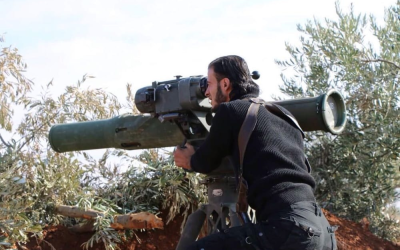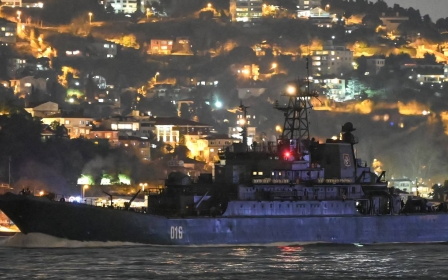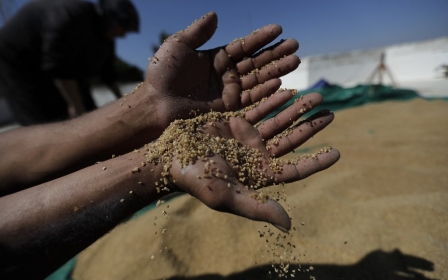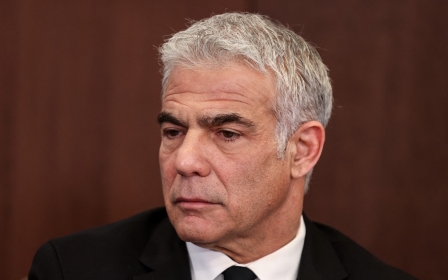Russia-Ukraine war: UK government won't say if it will use Syria law to deter fighters
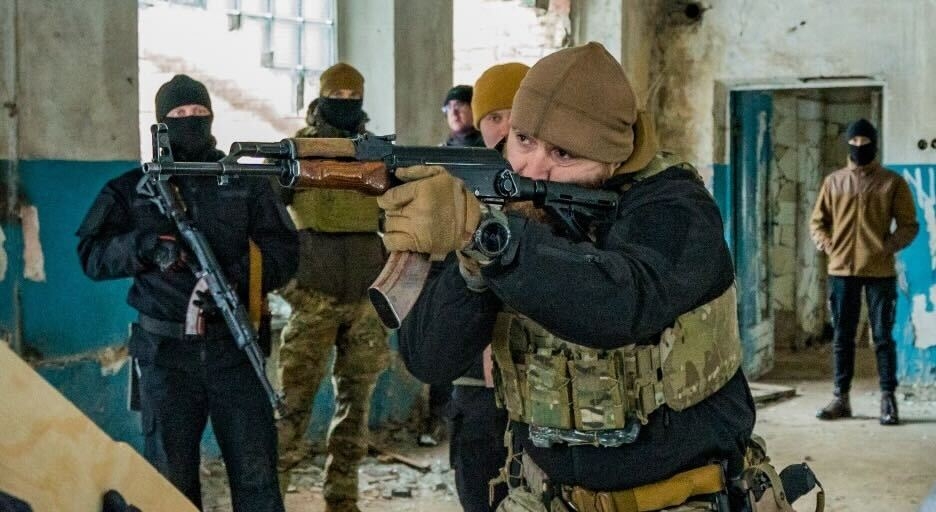
The UK government has declined to comment on whether it will use a new law created in response to security concerns over British nationals travelling to Syria and Iraq to deter people from going to Ukraine to fight against Russian forces.
The so-called "designated area offence", introduced in 2019, makes it illegal for British nationals or residents to travel to regions or countries where the home secretary has assessed their presence could pose a security risk to the UK.
New MEE newsletter: Jerusalem Dispatch
Sign up to get the latest insights and analysis on Israel-Palestine, alongside Turkey Unpacked and other MEE newsletters
According to government guidance, the law is intended to prevent British nationals from engaging in "terrorist-related activity", and from "travelling abroad to take part in or help sustain future foreign conflicts".
Middle East Eye asked the Home Office whether it was considering making Ukraine a designated area amid complaints of "mixed messaging" over the issue of British nationals travelling to the country, and concerns over the involvement of far-right groups in the escalating conflict.
But a Home Office spokesperson told MEE the issue of British nationals travelling to Ukraine was a matter for the Foreign, Commonwealth and Development Office (FCDO).
The FCDO told MEE that British nationals travelling to Ukraine did so at their own risk, and said it advised against all travel to Ukraine.
The FCDO's travel advice for British nationals in Ukraine also warns: "If you travel to eastern Ukraine to fight, or to assist others engaged in the conflict, your activities may amount to offences against UK terrorism or other legislation and you could be prosecuted on your return to the UK."
Call for volunteers
The escalation of the conflict since Russia last week launched an invasion of Ukraine has seen the government in Kiev call for international volunteers to join the defence of the country.
The Times newspaper on Tuesday reported that more than 150 former British Army paratroopers with combat experience in Afghanistan are "on their way to fight on the frontline", while a Ukrainian embassy official in London said hundreds of British nationals had expressed a desire to fight.
Speaking to BBC radio on Monday, Olek Tatsenko, a Ukrainian who lives in Britain, said he is actively helping organise volunteers to fight in Ukraine.
"I have lots of calls from people who are willing to join the defence of our country," said Tatsenko.
'I don’t think Liz Truss said we are supporting non-trained people to go and fight'
- Ben Wallace, UK defence secretary
"For now, it's mostly Ukrainians who have families [in Ukraine] and also I have calls from other nations - Brits, Latvians, Italians."
But confusion surrounds UK government policy on British fighters in Ukraine.
On Sunday, Liz Truss, the foreign secretary, said she "absolutely" supported British nationals who travelled to Ukraine to fight.
Speaking on Monday, Ben Wallace, the defence secretary, sought to clarify Truss's comments.
“I don’t think Liz Truss said we are supporting non-trained people to go and fight,” Wallace said.
He said there was no bar to prevent Ukrainian nationals in the UK or dual British-Ukrainian nationals from fighting. He said fighters should follow foreign office advice and should have military experience.
"If you’re going to be a fighter there, first of all please try and comply with the Foreign Office advice, because it is dangerous. But secondly, be trained, have experience, don’t be serving personnel. But fundamentally it is a dangerous situation, so if you are going to fight, be a professional, having had service,” Wallace said.
Prime Minister Boris Johnson's office said: "We fully recognise the strength of feeling in British people wanting to support Ukrainians," but added that the government advised against travel to the country.
Commenting on Twitter about a news report about a British volunteer with no links to Ukraine and no military experience, Baroness Warsi, a former chair of the governing Conservative Party, wrote on Twitter:
"Civilians travelling to war zones as foreign fighters is dangerous. We’ve been here before - it was wrong then, it’s wrong now. Mixed messaging is putting lives at risk."
'Double standards'
Fahad Ansari, an immigration lawyer who specialises in helping people who have been stripped of their British citizenship, said ministers' comments that appeared to encourage people to join the fight in Ukraine flew in the face of existing government policy on foreign fighters.
“For over 20 years, British Muslims who have travelled to war zones to help occupied people fight invading forces or oppressive regimes have been targeted by the authorities. If not stripped of their citizenship while abroad, they have been prosecuted for terrorism on return," Ansari told MEE.
'Would British Muslims who travel to Ukraine to fight Russian forces be treated as heroes or terrorists on return? Why is there a difference?'
- Fahad Ansari, immigration lawyer
"Would British Muslims who travel to Ukraine to fight Russian forces be treated as heroes or terrorists on return? Why is there a difference?
"And what explains the double standards when it comes to British people feeling the pain of the oppressed in Ukraine and British Muslims empathising with their oppressed co-religionists abroad?"
The designated area law was passed primarily in response to the perceived security threat posed by British nationals who had travelled to Syria and Iraq to join the Islamic State (IS) group and other militant groups.
Neil Basu, the head of counter-terrorism policing, said at the time that the law would have "real operational value" as a deterrent to prevent people from travelling to a "future conflict" and to prosecute people who returned from a conflict zone.
But the Home Office told MEE that no areas have been designated since the law was passed. The designation of an area requires parliamentary approval in advance of the designation taking effect.
Analysts have raised concerns that far-right groups in Europe could be among those sending fighters to Ukraine to fight against Russian forces with the intention of gaining military experience.
Last week, the Search International Terrorist Entities Intelligence Group (SITE) reported that the Russian attack had prompted far-right leaders in a number of European countries to urge their supporters to join the fight in Ukraine.
Rita Katz, the director of SITE, told the New York Times that far-right groups were motivated to travel to Ukraine to gain combat training.
She pointed too to the presence among Ukraine's paramilitary forces of the Azov Battalion, a unit of the Ukrainian National Guard formed in 2014 to fight pro-Russian separatists in eastern Ukraine which SITE said had drawn far-right fighters from around the world.
Middle East Eye delivers independent and unrivalled coverage and analysis of the Middle East, North Africa and beyond. To learn more about republishing this content and the associated fees, please fill out this form. More about MEE can be found here.


